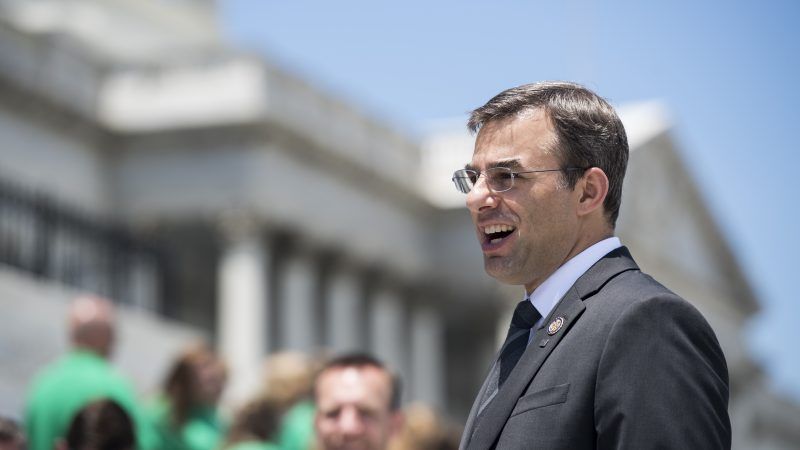It Probably Wouldn't Be Particularly 'Grueling' for Justin Amash To Win the Libertarian Party's Presidential Nod
Vanity Fair overstates the work it takes to be the Libertarian Party's presidential nominee.

In an otherwise smart Vanity Fair feature musing on Rep. Justin Amash's possible political future as a Libertarian Party presidential candidate, Tina Nguyen writes that "the path to the nomination [for the Libertarian Party] requires a grueling campaign, wherein Amash would have to win over the majority of a thousand-plus delegates from across the country, culminating in a convention next May."
The word "grueling" ain't necessarily so. The Libertarian Party is unique, as national chair Nicholas Sarwark explains in an email, in that its "national bylaws explicitly prohibit binding delegates prior to the convention or any kind of rule/block voting….All delegates must be able to vote their conscience. That's one of the things that makes our convention interesting in comparison to the two old parties."
So while candidates for the presidential nomination can spend lots of time campaigning directly to Libertarians across the nation, they don't have to. All they have to do is convince a bare majority of the delegates in a room in Austin in May 2020 to vote for them. (The total number of delegates will probably be around a thousand.) Given his national profile, there is every reason to believe Amash could do about as well making that decision a week or two before the convention as he would doing anything "grueling" between now and then.
David Bergland, for example, won the Libertarians' 1984 presidential nomination without having even intended to run until around a week before the convention. Bergland, granted, was an old party hand at the time, having held many positions in the organization and served as the 1976 vice presidential nominee. For a closer analogy to Amash's current position, consider Bob Barr in 2008. He was also a former Republican congressman, from Georgia, and one with more heresies in his past than Amash. Barr didn't fully announce his intention to seek the nomination until a couple of weeks before the convention in 2008.
Yes, the idea he might do so had been circulating for months before—but then, the idea Amash might is already circulating now. Just this morning on CNN, 2016 Libertarian vice presidential nominee William Weld, who has called Amash a "hero," said it is his guess that Amash will seek and win the Libertarian nod.
Barr did win the nomination in 2008. But Libertarian Party delegates don't always behave in ways that an outside political observer would consider obvious. It might seem like a given that of course a small third party would be thrilled to be courted by a figure with national political experience such as Barr. But Barr's victory was hard won, on the sixth ballot, and even then with just 51 percent of the vote.
For that matter: Even after having won the Libertarian presidential nomination in 2012, even after earning what was then the party's largest raw vote total in its history, and even with his executive experience as the former Republican governor of New Mexico, it was no cakewalk for Gary Johnson to win the nomination again in 2016. Most of the media had pretty much preemptively declared Johnson the winner, but it took two ballots for him to get the 55 percent needed to squeak ahead of Austin Petersen, someone who had never held or even run for any office before seeking the Libertarian presidential nomination.
My point: Because of the unique nature of the Libertarian Party's selection process, the only thing a candidate needs to do is get in front of the maybe 1,000 or so delegates at a convention, let them know he or she wants their vote, and get 500 or so of them to give it. That can take "grueling" months of shaking hands at 50 state conventions where the delegates who get to vote for president at the national convention are selected. But it doesn't have to, especially if you have a name and reputation that most of the delegates will already have heard of, which Amash certainly does.
Ron Nielson, Johnson's 2016 campaign manager, tells me that his team deliberately kept the idea of Weld as Johnson's VP under wraps as long as they reasonably could, in order to slow down any possible whisper campaign dinging Libertarians' willingness to give him the vice presidential nod (which is a completely separate delegate vote, one it took two ballots before Weld squeaked to a 50.5 percent victory).
So there is a strong possibility that Amash would not be harming his chances, and might possibly be helping them, by not openly entering the Libertarian scrum until the last minute. But even then, a more likely path to victory would be not instant acclamation but a hard, though short, fight.
That said, Libertarian delegates are a cussed and curious lot. There would almost certainly be some feeling that a last-minute Amash is a carpetbagger who hadn't earned his Libertarian stripes by doing any retail-level campaigning for Libertarian hearts.
As Nielson says, "People who put in a lot of time and effort want others involved to put in the same amount of time and effort. There can be a reluctance to allow someone to come in at the last minute and get this prized possession." So Neilson thinks waiting too long to announce could be "a foolish choice" for Amash. It ultimately depends, he thinks, on the other choices before the party when the convention comes around.


Show Comments (61)